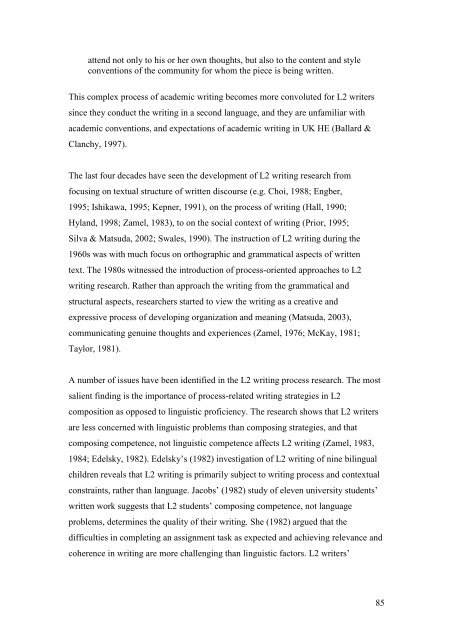The challenge of academic writing for Chinese students within ...
The challenge of academic writing for Chinese students within ...
The challenge of academic writing for Chinese students within ...
You also want an ePaper? Increase the reach of your titles
YUMPU automatically turns print PDFs into web optimized ePapers that Google loves.
attend not only to his or her own thoughts, but also to the content and style<br />
conventions <strong>of</strong> the community <strong>for</strong> whom the piece is being written.<br />
This complex process <strong>of</strong> <strong>academic</strong> <strong>writing</strong> becomes more convoluted <strong>for</strong> L2 writers<br />
since they conduct the <strong>writing</strong> in a second language, and they are unfamiliar with<br />
<strong>academic</strong> conventions, and expectations <strong>of</strong> <strong>academic</strong> <strong>writing</strong> in UK HE (Ballard &<br />
Clanchy, 1997).<br />
<strong>The</strong> last four decades have seen the development <strong>of</strong> L2 <strong>writing</strong> research from<br />
focusing on textual structure <strong>of</strong> written discourse (e.g. Choi, 1988; Engber,<br />
1995; Ishikawa, 1995; Kepner, 1991), on the process <strong>of</strong> <strong>writing</strong> (Hall, 1990;<br />
Hyland, 1998; Zamel, 1983), to on the social context <strong>of</strong> <strong>writing</strong> (Prior, 1995;<br />
Silva & Matsuda, 2002; Swales, 1990). <strong>The</strong> instruction <strong>of</strong> L2 <strong>writing</strong> during the<br />
1960s was with much focus on orthographic and grammatical aspects <strong>of</strong> written<br />
text. <strong>The</strong> 1980s witnessed the introduction <strong>of</strong> process-oriented approaches to L2<br />
<strong>writing</strong> research. Rather than approach the <strong>writing</strong> from the grammatical and<br />
structural aspects, researchers started to view the <strong>writing</strong> as a creative and<br />
expressive process <strong>of</strong> developing organization and meaning (Matsuda, 2003),<br />
communicating genuine thoughts and experiences (Zamel, 1976; McKay, 1981;<br />
Taylor, 1981).<br />
A number <strong>of</strong> issues have been identified in the L2 <strong>writing</strong> process research. <strong>The</strong> most<br />
salient finding is the importance <strong>of</strong> process-related <strong>writing</strong> strategies in L2<br />
composition as opposed to linguistic pr<strong>of</strong>iciency. <strong>The</strong> research shows that L2 writers<br />
are less concerned with linguistic problems than composing strategies, and that<br />
composing competence, not linguistic competence affects L2 <strong>writing</strong> (Zamel, 1983,<br />
1984; Edelsky, 1982). Edelsky‘s (1982) investigation <strong>of</strong> L2 <strong>writing</strong> <strong>of</strong> nine bilingual<br />
children reveals that L2 <strong>writing</strong> is primarily subject to <strong>writing</strong> process and contextual<br />
constraints, rather than language. Jacobs‘ (1982) study <strong>of</strong> eleven university <strong>students</strong>‘<br />
written work suggests that L2 <strong>students</strong>‘ composing competence, not language<br />
problems, determines the quality <strong>of</strong> their <strong>writing</strong>. She (1982) argued that the<br />
difficulties in completing an assignment task as expected and achieving relevance and<br />
coherence in <strong>writing</strong> are more challenging than linguistic factors. L2 writers‘<br />
85


